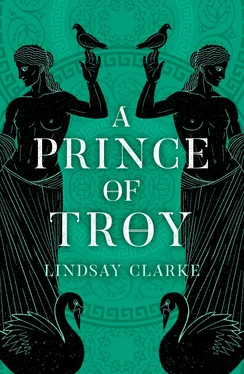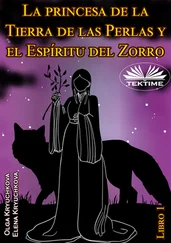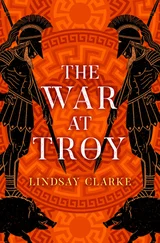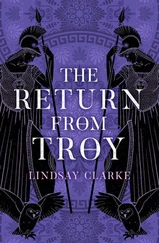It began with a prickling sensation that he was being watched. Paris looked up from a pensive daydream and saw only his herd of grazing animals. They seemed, if anything, less alert than he was. Then, out of the corner of his eye, he caught a brief shimmering of light. When he turned his head, the trembling in the air shifted to the other side. Perplexed, Paris moved his gaze in that direction and heard a soft chuckle. Directly ahead of him in the dense shade of a pine, a male figure shivered into focus. Wearing a broad-brimmed travelling-hat and a light cloak draped across his slender form, he leaned against the trunk of the tree with the thumb of one hand tucked into his belt and holding a white-ribboned wand in the other. His head was tilted quizzically as though to appraise the herdsman’s startled face.
Paris leapt to his feet, sensing that he was in the presence of a god.
A buzzard still glided through the sky’s unsullied blue. The familiar view stretched below him to the rivers watering the plain of Troy. Yet it was as though he had stepped across a threshold of light into a more intense arena of awareness, for the feel of everything was altered. Even the air tasted thinner and sharper as though he had been lifted to a higher altitude. And it was the god Hermes who gestured with his staff.
‘Zeus has commanded me to come. We need to talk, you and I.’
And with no sign of having moved at all, he was standing beside Paris, suggesting that they both recline on the grass while he explained his mission.
‘Firstly,’ Hermes said, ‘you might care to examine this.’ He took something shiny from the bag slung at his belt and handed it to Paris who looked down at the flash of sunlight from the golden apple that now lay in the palm of his hand. Turning it there, he ran his thumb over the words of an inscription and glanced back up at the god in bewilderment.
Hermes smiled. ‘It says To the Fairest . Pretty, isn’t it? But you wouldn’t believe the trouble it’s caused. That’s what brings me here. We gods are in need of help, you see.’ He took in the young man’s puzzled frown. ‘But none of this will make any sense to you unless I first tell you something of the story of Peleus.’
It’s possible, I suppose, that it all started that way, though Odysseus always insisted that the war at Troy began where all wars begin – in the hearts and minds of mortal men. By then he had come to think of war as a dreadful patrimony passed on from one generation to the next, and he traced the seeds of the conflict back to the fathers of the men who fought those battles on the windy plain. Peleus was one of those fathers.
Odysseus himself was still a young man when he befriended Peleus, who had long been honoured as among the noblest souls in a generation of great Argive heroes. There had been a time too when Peleus had seemed, of all mortals, the one most favoured by the gods. Yet, much to his dismay, the young Ithacan adventurer found him to be a man of sorrows, prone to long fits of silent gloom over a life that had been shadowed by terrible losses. During the course of a single night Peleus told Odysseus as much of his story as he could bear to tell.
It began with a quarrel among three young men on the island of Aegina, a quarrel which ended with two of them in exile, and the other dead. Only just out of boyhood, Peleus and Telamon were the elder sons of Aeacus, a king renowned throughout all Argos and beyond for his great piety and justice. If Aeacus had a weakness it was that he favoured the youngest of his sons, a youth named Phocus, who had been born not to his wife, but to a priestess of the seal-cult on the island.
Displaced in their ageing father’s affections, Peleus and Telamon nursed a lively dislike for this good-looking half-brother who was as sleek and muscular as the seal for which he was named, and excelled in all things, especially as an athlete. Their resentment turned to hatred when they began to suspect that Aeacus intended to name Phocus as his successor to the throne. Why else should he have been recalled to the island after he had voluntarily gone abroad to keep the peace? Certainly, the king’s wife thought so, and she urged her own sons to look to their interests.
What happened next remains uncertain. We know that Telamon and Peleus challenged their half-brother to a fivefold contest of athletics. We know that they emerged alive from that contest and that Phocus did not. We know too that the elder brothers claimed that his death was an accident – a stroke of ill luck when the stone discus thrown by Telamon went astray and struck him in the head. But there were also reports that there was more than one wound on the body, which was, in any case, found hidden in a wood.
Aeacus had no doubt of his sons’ guilt, and both would have been killed if they had not realized their danger in time and fled the island. But the brothers then went separate ways, which leads me to believe that Peleus spoke the truth when he told his friend Odysseus that he had only reluctantly gone along with Telamon’s plan to murder Phocus.
Whatever the case, when his father refused to listen to his claims of innocence, Telamon sought refuge on the island of Salamis, where he married the king’s daughter and eventually succeeded to the throne. Peleus meanwhile fled northwards into Thessaly and found sanctuary there at the court of Actor, King of the Myrmidons.
Peleus was warmly welcomed by King Actor’s son Eurytion. The two men quickly became friends, and when he learned what had happened on Aegina, Eurytion agreed to purify Peleus of the guilt of Phocus’s death. Their friendship was sealed when Peleus was married to Eurytion’s sister Polymela.
Not long after the wedding, reports came in of a great boar that was ravaging the cattle and crops of the neighbouring kingdom of Calydon. When Peleus heard that many of the greatest heroes of the age, including Theseus and Jason, were gathering to hunt down the boar, and that his brother Telamon would be numbered among them, he set out with Eurytion to join the chase.
Outside of warfare, there can rarely have been a more disastrous expedition than the hunt for the Calydonian boar. Because the king of that country had neglected to observe her rites, Divine Artemis had driven the boar mad, and it fought for its life with a fearful frenzy. By the time it was flushed into the open out of a densely thicketed stream, two men had already been killed, and a third hamstrung. An arrow was loosed by the virgin huntress Atalanta which struck the boar behind the ear. Telamon leapt forward with his boar-spear to finish the brute off, but he tripped on a tree-root and lost his footing. When Peleus rushed in to pull his brother to his feet, he looked up and saw the boar goring the guts out of another huntsman with its tusks. In too much haste, he hurled his javelin and saw it fly wide to lodge in the ribs of his friend Eurytion.
With two deaths on his conscience now, Peleus could not bear to face his bride Polymela or his friend’s grieving father. So he retreated to the city of Iolcus with one of the other huntsmen, King Acastus, who offered to purify him of this new blood-guilt. But the shadows were still deepening around Peleus’s life for while he was in Iolcus, Cretheis, the wife of Acastus, developed an unholy passion for him.
Embarrassed by her approaches, Peleus tried to fend her off, but when he rebuffed her more firmly, she sulked at first, and then her passion turned cruel. To avenge her humiliation, she sent word to Polymela that Peleus had forsaken her and intended to marry her own daughter. Two days later, having no idea what Cretheis had done, and assuming therefore that all the dreadful guilt of it was his, Peleus learned that his wife had hanged herself.
For a time he was out of his mind with grief. But his trials were not yet over. Alarmed by the consequences of her malice, Cretheis sought to cover her tracks by telling her husband that Peleus had tried to rape her. But having bound himself to Peleus in the rites of cleansing, Acastus had no wish to incur a sacrilegious blood-guilt of his own, so he took advice from his priests. Some time later he approached Peleus with a proposal.
Читать дальше












